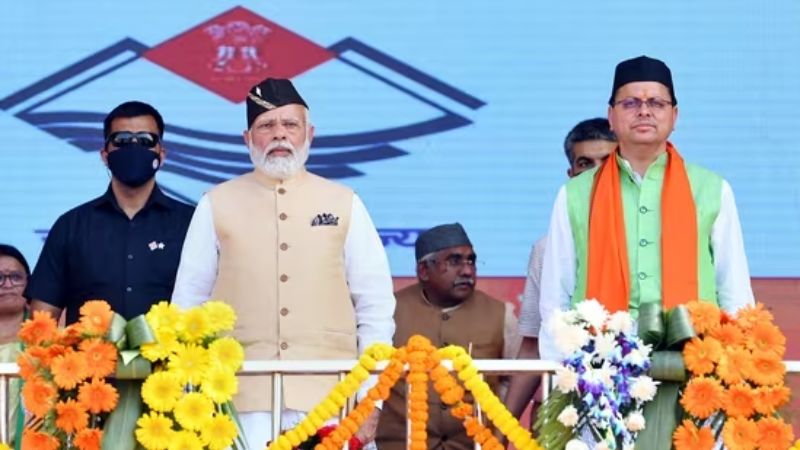In a groundbreaking move, under the leadership of Prime Minister Narendra Modi and Chief Minister Pushkar Singh Dhami, Uttarakhand has become the first state in India to successfully pass and implement the Uniform Civil Code (UCC).[1] The UCC aims to provide equal rights to all citizens, regardless of their caste, gender, religion, or beliefs, marking a significant milestone for the Bharatiya Janata Party (BJP) and the broader vision of the Prime Minister.[2]
The UCC has long been a priority for the BJP, reflecting their commitment to creating a more inclusive and equitable society. The move in Uttarakhand is seen as a bold step towards realizing this vision, and the government has expressed its intention to extend the implementation to other states where the BJP holds power.
The Uniform Civil Code is a comprehensive set of laws governing personal matters such as marriage, divorce, inheritance, and adoption, aiming to provide a common set of rules for all citizens. The implementation of UCC has been a contentious issue in India, as it seeks to overcome the existing diversity in personal laws based on religious beliefs.
The successful passage of the UCC in Uttarakhand is seen as a testament to the government’s commitment to its vision. Prime Minister Modi, known for his decisive leadership, has repeatedly emphasized the importance of providing equal rights to all citizens, regardless of their background.
The move is expected to have a far-reaching impact on various communities, especially Muslim women who have often faced discriminatory practices under the Muslim personal law. The UCC seeks to empower women by ensuring they receive the same legal rights as men, addressing longstanding issues of inequality.
While the UCC aims to create a uniform legal framework, it is important to note that it will not interfere with individuals’ freedom to practice their religion or violate their fundamental rights. The emphasis is on creating a more just and equal society, without impinging on personal beliefs.
The BJP-led National Democratic Alliance (NDA) is now gearing up to extend the implementation of the Uniform Civil Code to other states where the party holds power. This move is likely to face challenges and opposition from various quarters, as the UCC has been a subject of debate and discussion for years.
Political analysts suggest that the successful implementation of the UCC in Uttarakhand could pave the way for similar reforms in other states, creating a ripple effect across the country. However, the government is aware that the road ahead may not be smooth, as different states have diverse cultural, religious, and social considerations.
Opposition parties have already raised concerns, arguing that the UCC might infringe upon the cultural and religious diversity of the country. Some critics argue that a one-size-fits-all approach might not be suitable for a nation as diverse as India, where traditions and customs vary widely.
Despite the challenges, the BJP remains steadfast in its commitment to implementing the UCC nationwide. The party believes that a uniform set of laws will promote unity and eliminate discriminatory practices, fostering a more cohesive and progressive society.
The implementation of the UCC in Uttarakhand marks a significant moment in India’s legal history. It reflects the government’s determination to create a more egalitarian society and address issues of gender and religious discrimination. As the NDA pushes forward with its plans to introduce the UCC in other states, the nation watches closely, anticipating further developments in this historic journey towards a more uniform and inclusive legal framework.
References:
- United States Code: Containing the General and Permanent Laws of the United States, Enacted Through the 112th Congress (ending January 2, 2013, the Last Law of which was Signed on January 15, 2013). (2013). United States: Office of the Law Revision Counsel of the House of Representatives.
- Uniform Civil Code: Towards Unified Bharat. (280). (n.p.): Blue Rose Publishers.

